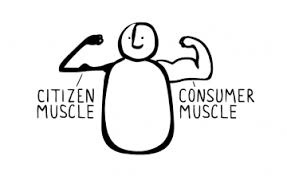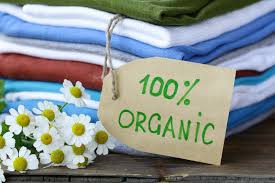-How does the economic crisis affect the consumer's habits?
In Spain, the economic crisis fell in 2008. Since that year, a lot of people got poorer and the better-off, got richer.
Surprisingly, the tendency to overbuy did not disappear. While it’s true that there were families that had to reduce their “consumerist tendency” due to the lack of money to do so, and the food consumption did reduce by 40%, the reduction in areas of technology and beauty were, surprisingly, not too affected.
Currently, the crisis is almost overcome. The supposed “poverty” percentage hasn’t improved much but our society’s need to constantly spend and buy has certainly developed and has surprisingly been the factor that most helped the country along. But that makes us stop and think: are we citizens... or consumers?

- Are we citizens... or consumers?
“Consumer” may sound like an intimidating word but it is just used to refer to people unable to spend responsibly according to need, not simple enjoyment. The word also describes the aftermath of the purchases, the irresponsible disposal instead of recycling etc... The actions of such people sadly fit in with a lot of our lifestyles and are far from being a necessity. It has become merely a ludicrous activity to pass time.The constant publicity and must-haves in the fashion industry take many of us to the search of momentary illusions that the products will provide. But what we need to realise is that the consequences don’t only affect our wallets but the precious few resources that our planet can still offer. Between the constant growth of production and, in turn, of the consumers, it is completely impossible that our planet will survive in the long run. This, however, at no point rules out the hope filling possibility that there’s a way of producing products that are compatible with the possibilities that our nature offers without wiping it out completely.

- Future of consumersism
However, as experts have foreseen from the beginning, consumerism as a system can not continue forever; it will bring its own destruction. And the planets limitations of fossil fuels, environmental limits (such as climate change, ocean acidification, and other pollution dilemmas), and debt limits seem to be approaching fast. While there may be short-term ways of opposing these limits, on the long-run, they’re inevitable. Consumerism is doomed. But since consumerism is effectively the economy’s biggest income (approx. 70%) the end of this trend will take down our economy with it.
A disaster is coming. We can’t know exactly when it will occur or how bad it actually will be but what we can say for sure is that when it arrives it will create an economic depression and if we’ve learnt anything from history is that they usually end up in conflicts or maybe even wars. Also with the worsening environment, it looks like we won’t have much time to lament the disaster before the “predicted and currently unstoppable rising sea levels, waves of environmental refugees, droughts, floods, famines, and collapsing economies” (as said by UN reports) catch up with us.
By now, the scene is pretty depressing, is there any hope at all? Yes. Consumerism arose from a certain set of circumstances at the start of the 21st century, if we change our patterns will change with us.
To see forward we must take example from the past and the consumerist economy of the 20th century was driven by cheap energy and overproduction. Now, the consumerist economy of the 21st century will be dictated by energy limits, environmental crisis, and debt.
https://www.acfilosofia.org/materialesmn/filosofia-y-ciudadania/el-saber-filosofico/48-news/noticias/144-itiene-futuro-el-consumismo

-Future consumption
All of this is the reason why we ponder what will consumerism be like in the future? Will we be as careless as we are now? Natural resources are still present in our planet but in 100 years time will we be able to buy something that is not made organically (with bio materials)?
The answer is no. Our future leans firmly on an ecologic base. An example of this is the transport industry (in which lots of companies have started creating more ecologic cars). So the general consume will be of ecologic products (clothes, food, cars...) and this undoubtedly will affect our lives in simple but undeniable ways like having to spend a few euros more on our clothes because they're all organic and more expensive.
http://www.postcarbon.org/the-brief-tragic-reign-of-consumerism-and-the-birth-of-a-happy-alternative/

-How many Bio-Farmers exist in spain?
Catalunya has 3,389 registered organic producers according to official data from the Spanish Ministry of Agriculture. Having said this, few people are interested in buying organic products, out of every 10 people, only two or three people prefer organic products.
The economic class-based distinction to this also needs to be taken into account. In general, it's the more "well-off" who can shop ethically, while those in poorer neighborhoods are naturally more concerned with making ends meet and getting a good return for their money.
In the future this will also change due to the fact that most of our products will be ecologic. Therefore, 90% of society will be consuming ecologic products.
Survey on clothing consumption
You should only tick one thing at a time. At the first question, you can tick more than one thing.
What do you pay attention when you buy clothes?
-
Quality
-
Price
-
Clothing line
-
Material
-
Country of origin
-
Trend / Fashion
-
Functionality
What usually moves you to buying clothes?
-
Need
-
Old clothes not modern
-
Go shopping
-
Cheap price
What is the main motive for buying clothes?
-
Need
-
Old clothes not modern
-
Go shopping
-
Bargain
How much money do you spend on clothing on a monthly basis?
-
Up to 50€
-
51€ - 100€
-
101€ - 200€
-
More than 200€
What a possibility of clothes shopping do you use?
-
Fashion Boutique
-
Department store
-
Catalog / TV-shipping
-
Internet-shipping
-
Get made
You sort out your clothes when …
Where are you going to get your clothes sorted out?
Do you know where your clothes are made?
If you imagine the contents of your wardrobe, how much do you actually use?
-
To 25%
-
To 50%
-
To 75%
-
To 100%
| Line Panetzki |
Luca Politze |
Ana Reid |
Pol Turu |